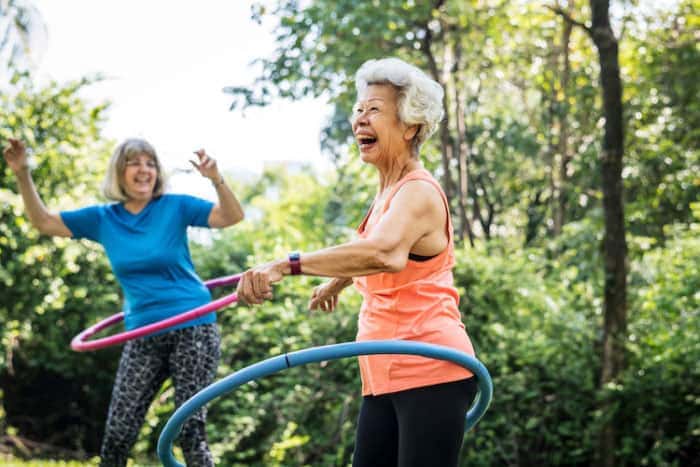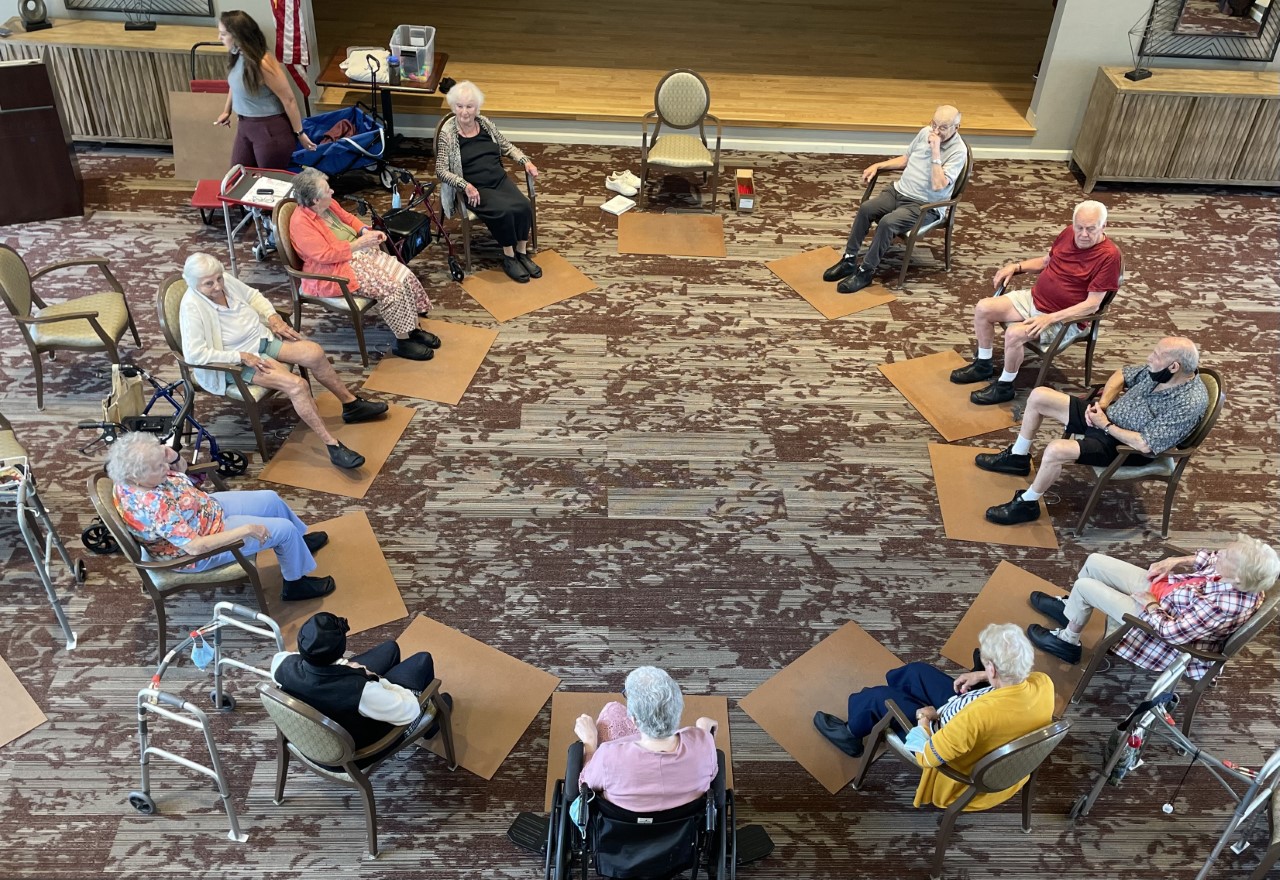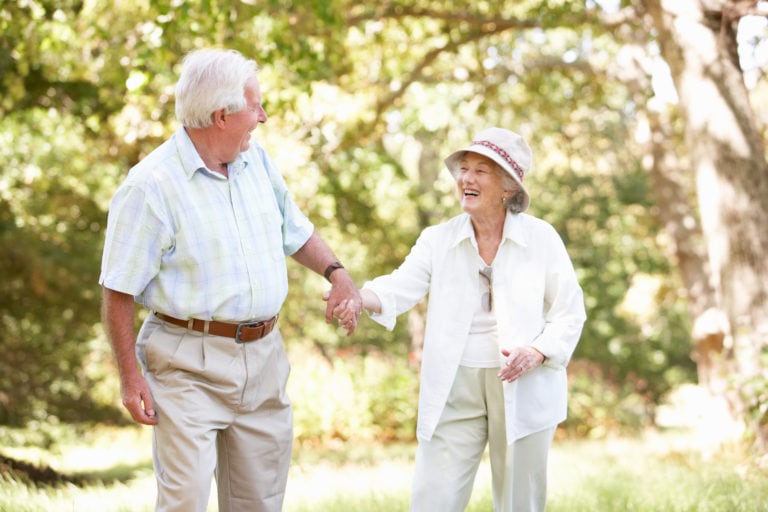Aging is inevitable. Maintaining a happy and healthy life takes exercise, proper nutrition, and staying socially active. A healthy lifestyle enables an active, fulfilled life.
Be Physically Active
Regular exercise at a level comfortable for you is an important foundation for maintaining an active lifestyle. A sedentary routine leads to weight gain and is unhealthy. Exercising as we age is crucial in decreasing stress and the risk of heart disease and depression.
It is always a wise idea to check with your physician before beginning any exercise program.
Walking
Walking is a great way to begin an exercise program. Make 30 minutes per day a goal but begin slowly with shorter strolls. Walk briskly enough to feel a little breathless. Walking helps keep brain cells healthy by delivering more blood and oxygen. The American Heart Association recommends working up to 150 minutes of moderate-intensity aerobic physical activity (brisk walking) every week. If you are able, try a more vigorous aerobic activity such as jogging or running, for 75 minutes each week.
An Exercise Routine
Add strength training and flexibility exercises to your aerobic activities to make your exercise plan more effective. Strength training will increase muscle mass and bone density, as well as decrease body fat. It can lead to longer-lasting blood pressure control. Resistance training also helps increase muscle mass and helps in controlling weight. Include exercises such as squats, lunges, leg lifts, push-ups, planks and numerous core-strengthening exercises. Be sure to involve exercises that strengthen every major muscle group.
Avoid Injuries
Older adults are more prone to injury during exercise because of certain degenerative and elasticity changes in the body. It is always a good idea to check with your physician before beginning any exercise program. Balance may not be what it once was, and some medications can affect exercise performance. Be sure to avoid doing the same movement too often to prevent overuse injuries.
Balance Exercises
To help increase balance and strengthen your back and spine, simple exercises that target the muscles around the spine can be helpful.
- Stand on One Foot – Stand behind a sturdy chair, holding on for balance, and raise one leg off the floor. Hold for 10 seconds. Repeat 10 times. Repeat with your other leg.
- Heel to Toe Walking – Position the heel of one foot in front of the toes of the other foot (almost touching). Select a spot ahead of you and focus on it to keep you steady as you walk. Repeat this for 20 steps.
- Balance Walk – Raise your arms to your sides at shoulder height. Focus on a spot ahead of you and walk in a line with one foot ahead of the other. As you walk, lift your back leg slightly and hold for one second before stepping in front. Alternate legs and repeat for 20 steps.
- Back Leg Raises – Stand behind a sturdy chair and grip it for balance. Breathe in; then, breathe out while slowly lifting one leg directly back without bending your knee or pointing your toes. Don’t lean forward. Keep the leg you are standing on slightly bent. Hold for one second and then repeat this10 times. Repeat with the other leg 10 times.
- Side Leg Raises – Again, stand behind a sturdy chair with feet slightly apart. Breathe in; then breathe out while slowly lifting one leg out to the side. Keep your back straight and your toes pointing forward. Keep the leg you are standing on slightly bent. Hold for one second and then repeat this10 times. Repeat with the other leg 10 times.
Swimming
Swimming raises your heart rate and is gentle on an arthritic body. It is also a great mood-booster and helps ward off depression, especially if the pool is outdoors and the sun is shining.
Tai Chi
This gentle ancient Chinese exercise combines slow, graceful movements while standing and deep breathing. Tai Chi can help older adults avoid falls, by increasing balance; it can also ease stress, strengthen muscles, increase flexibility, and lessen arthritic pain.
Getting Proper Nutrition
It is important to eat a healthy, well-balanced diet. Your metabolism slows as you get older, so you may not require the same number of calories you did when you were younger and more active. Avoid sweet, salty, and processed products. Instead select fresh whole foods such as fruits, vegetables, and whole grains.
Many adults in the US consume more than double the recommended daily allowance of sodium, which can lead to hypertension and cardiovascular disease. Most of this high sodium comes from pre-packaged foods. Read labels to watch for high sodium and artificial ingredients. Reduce the amount of white starches and refined sugars in your diet, as it can cause increased appetite and cravings.
Stay Socially Active
Social interaction with friends and family is extremely important for older adults in maintaining physical and mental health. Seniors who are more socially active have lower rates of Alzheimer’s disease, decreased stress levels, and more positive feelings towards life in general.
Group Activities
Participating in social activities with a group of friends or family members can include enjoying meals together, joining an exercise class, taking walks, going to the movies and playing games or cards.
Get the Right Amount of Sleep
Lack of sleep triggers hormones that influence cravings and contribute towards a tendency to gain weight. Insufficient sleep leaves you tired and unfocused and can cause you to skip your exercise routine entirely. It can also cause irritability, memory problems, and an increased risk of falling.
Older adults need just as much sleep as younger adults – seven to nine hours per night. Often, however, seniors get by on far less sleep.
A Sleep Routine Helps
Develop a regular sleep routine and keep your bedroom dark and noise-free. Avoid watching TV or using electronic devices while in bed. Eliminate caffeine late in the day. These tips will go a long way to help your falling asleep faster and staying asleep.
Maintain Brain Function
Some cognitive decline is a normal part of aging; however, one in eight older adults (aged 65+) in the US has Alzheimer’s disease! Studies have shown a lifestyle that includes cognitive stimulation through learning slows a decline in brain function. Keep challenging your mind by learning something new. Take dance lessons; learn a new language; attend lectures; learn to play a musical instrument; read consistently; play word games or puzzles.
Reduce Stress
As we get older, the things that cause stress may change and our ability to deal with stress may be impaired as well. Long-term stress can damage brain cells and lead to depression. Stress may cause memory loss, fatigue, and decrease the ability to fight off and recover from infection.
We cannot avoid stressful situations entirely, but we can learn better techniques to cope with them. Talk to a loved one or counselor if you have stress. Try some relaxation techniques, such as breathing exercises, yoga, Tai Chi, or meditation. Keep things in perspective and try to accept and adapt to the things you cannot change.
In Conclusion
These keys are well-known, familiar themes worth repeating and reinforcing. Remembering their importance can help us all enjoy greater health and happiness as we get older.
Contact
In addition to housing, healthcare and programs for seniors, SALMON Health and Retirement communities offer resources for caregivers and family members. To learn more about the options available to you and your loved ones, contact us today for more information.




